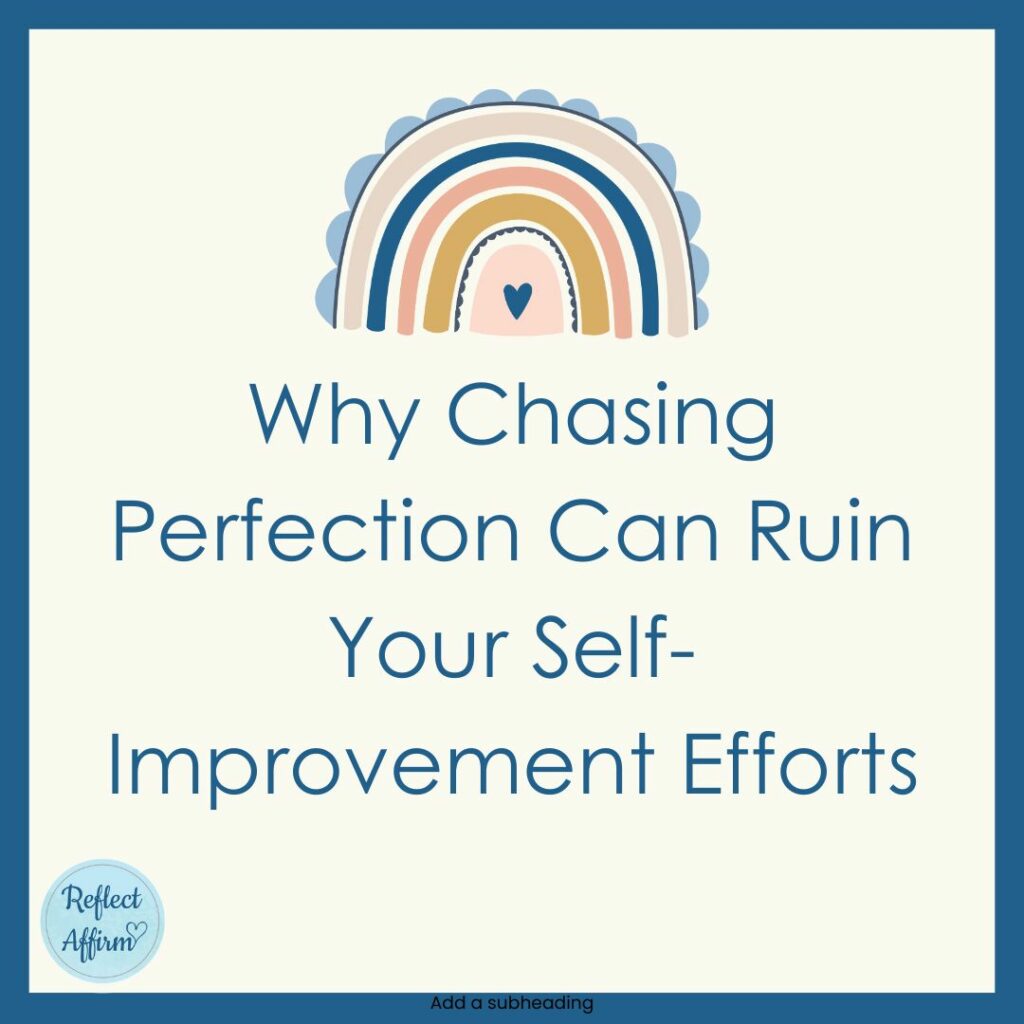
Ever found yourself stuck in a relentless cycle of striving for the perfect outcome, only to end up feeling frustrated and defeated? If so, you’re not alone. Many of us are caught in the grip of perfectionism, believing that if we just achieve a flawless result, everything will fall into place.
But what if I told you that chasing perfection could be sabotaging your self-improvement efforts?
1. It Creates Unrealistic Expectations
Imagine setting out to achieve a goal with the belief that it must be perfect. Sounds motivating, right? But here’s the reality check: perfection is an illusion—an unattainable standard that often leads to disappointment. When you aim for perfection, you’re essentially setting yourself up with unrealistic expectations that are almost impossible to meet.
This relentless quest for flawlessness means you’re always measuring yourself against an ideal that doesn’t exist. It’s like trying to catch the wind; the harder you chase it, the more elusive it becomes.
Instead of celebrating the progress you’ve made, you’re focused on what’s missing or what could have been done better. This can leave you feeling constantly dissatisfied and unfulfilled, even when you’ve made significant strides.
2. Leads to Constant Self-Criticism
Ever found yourself scrutinizing every detail of a project, berating yourself for not getting it “just right”? Chasing perfection often means you become your own harshest critic. This constant self-criticism isn’t just demoralizing—it can erode your self-confidence and enthusiasm.
When perfectionism takes hold, every minor mistake or imperfection becomes a major point of contention with yourself. Instead of acknowledging your hard work and achievements, you’re caught up in a cycle of self-judgment.
This relentless inner dialogue can undermine your motivation and make you question your abilities. It’s like being in a never-ending argument with yourself, where the only outcome is frustration.
3. Prevents You from Embracing Progress
Do you find yourself waiting for the “perfect” moment to start something new, thinking that you’ll only begin when everything is perfectly aligned? This mindset can prevent you from taking meaningful action and appreciating the progress you’ve made.
Perfectionism can make you hesitant to move forward because you’re fixated on achieving an ideal state rather than recognizing the value of incremental progress. This often leads to procrastination, as you wait for the right conditions or the perfect plan to come together.
By focusing on making small, manageable improvements rather than an unattainable ideal, you can keep moving forward and build momentum. Embrace the idea that progress, no matter how small, is still a step in the right direction.
4. Causes Paralysis by Analysis
Have you ever spent so much time analyzing every detail that you ended up doing nothing at all? This is a classic sign of “paralysis by analysis,” where the pursuit of perfection leaves you stuck in the planning stage.
When you’re obsessed with getting everything just right, it’s easy to become overwhelmed by the sheer volume of details and possibilities. This overthinking can freeze you in place, making it difficult to take action.
Instead of getting bogged down by every potential flaw or complication, try to focus on taking concrete steps toward your goal. Sometimes, taking imperfect action is better than waiting for the perfect plan or outcome.
5. Neglects the Value of Learning from Mistakes
Mistakes are often viewed as failures when you’re caught in the perfectionism trap, but they’re actually some of the most valuable learning experiences. Chasing perfection can make you see mistakes as something to be avoided at all costs, rather than as opportunities for growth.
By fearing mistakes, you miss out on crucial lessons and insights that come from trial and error. Embracing errors as part of the learning process allows you to refine your skills and gain a deeper understanding.
6. Drains Your Motivation and Energy
Ever felt completely drained by the pursuit of perfection? The constant push for flawless outcomes can be incredibly taxing, both mentally and physically. This relentless drive often requires an enormous amount of time and energy, leaving you feeling burnt out and demotivated.
Perfectionism can turn every task into a monumental challenge, overshadowing the joy of completing it with the exhaustion of striving for an ideal. When you’re constantly chasing an unattainable standard, the satisfaction of achieving your goals can be diminished by the fatigue of the pursuit.
7. Impacts Your Mental Health Negatively
The pursuit of perfection can seriously affect your mental health. The pressure to be flawless can lead to anxiety, stress, and even depression. When you’re constantly striving for an unattainable ideal, the weight of that pressure can create a negative mental spiral.
Perfectionism can lead to chronic stress, as you’re always worried about not meeting your own high standards. This ongoing strain can affect your overall well-being and make it difficult to enjoy the process of self-improvement.
Shifting your focus from perfection to progress allows you to approach your goals with a healthier mindset, reducing stress and fostering a more positive outlook.
8. Stifles Creativity and Innovation
Ever felt like your creativity is stifled by the need for perfection? When you’re preoccupied with making everything flawless, it can be tough to take creative risks and explore new ideas.
Perfectionism often creates a fear of making mistakes, which can stifle your ability to innovate. Creativity thrives in an environment where experimentation and risk-taking are encouraged. By letting go of the need for everything to be perfect, you can open yourself up to new possibilities and unleash your creative potential. Embrace the idea that not everything has to be perfect to be valuable or innovative.
Embrace the Journey: Finding Fulfillment in Imperfect Progress
So, what’s the antidote to the perfection trap? Embrace the journey and find fulfillment in the progress you make along the way. Instead of striving for an unattainable ideal, focus on the small, meaningful steps that lead to growth and improvement.
Real self-improvement isn’t about achieving perfection—it’s about making steady progress, learning from your experiences, and enjoying the process. By letting go of perfectionism and embracing imperfection, you can unlock your full potential and find greater satisfaction in your journey.




